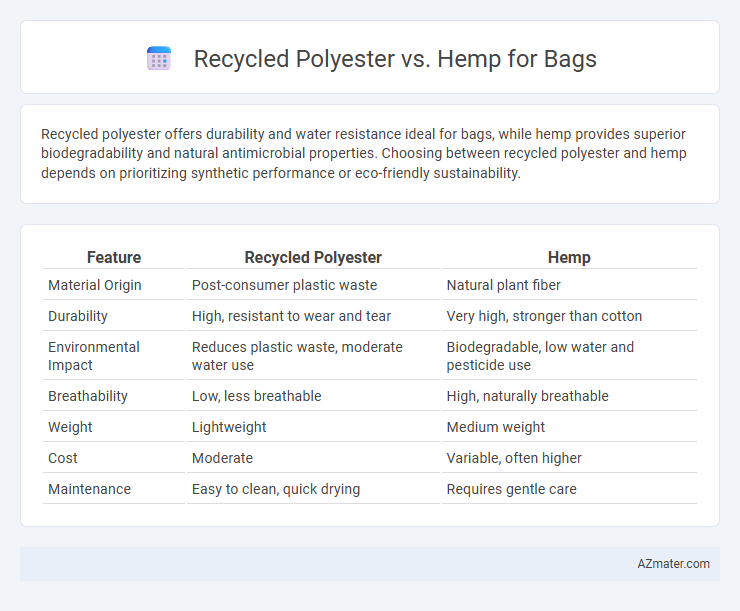Recycled polyester offers durability and water resistance ideal for bags, while hemp provides superior biodegradability and natural antimicrobial properties. Choosing between recycled polyester and hemp depends on prioritizing synthetic performance or eco-friendly sustainability.
Table of Comparison
| Feature | Recycled Polyester | Hemp |
|---|---|---|
| Material Origin | Post-consumer plastic waste | Natural plant fiber |
| Durability | High, resistant to wear and tear | Very high, stronger than cotton |
| Environmental Impact | Reduces plastic waste, moderate water use | Biodegradable, low water and pesticide use |
| Breathability | Low, less breathable | High, naturally breathable |
| Weight | Lightweight | Medium weight |
| Cost | Moderate | Variable, often higher |
| Maintenance | Easy to clean, quick drying | Requires gentle care |
Introduction to Sustainable Bag Materials
Recycled polyester, derived from post-consumer plastic bottles, offers durability and water resistance, making it a popular choice for sustainable bag materials. Hemp, a biodegradable natural fiber, provides exceptional strength and breathability while requiring minimal water and pesticides for cultivation. Both materials present eco-friendly alternatives to conventional plastics, contributing to reduced environmental impact in bag production.
Overview of Recycled Polyester
Recycled polyester is a sustainable fabric made from post-consumer plastic bottles and industrial polyester waste, reducing landfill waste and lowering carbon emissions by up to 75% compared to virgin polyester production. It offers high durability, moisture resistance, and vibrant color retention, making it a popular choice for bags used in outdoor and everyday settings. Recycled polyester's ability to repurpose plastic waste supports circular economy goals while maintaining the functional qualities required for long-lasting, eco-friendly bags.
Overview of Hemp Fabric
Hemp fabric is derived from the fibers of the Cannabis sativa plant, known for its durability, breathability, and natural resistance to mold and UV light, making it ideal for sustainable bag production. Compared to recycled polyester, hemp is biodegradable and requires significantly less water and pesticides during cultivation, contributing to a lower environmental impact. Its sturdy texture and long-lasting quality ensure that hemp bags offer an eco-friendly alternative with enhanced strength and minimal chemical processing.
Environmental Impact: Recycled Polyester vs Hemp
Recycled polyester significantly reduces waste by repurposing plastic bottles, lowering reliance on virgin petroleum but still involves energy-intensive manufacturing and microplastic pollution. Hemp offers superior environmental benefits with rapid growth, minimal water and pesticide use, and full biodegradability, making it a highly sustainable choice for bags. When comparing recycled polyester and hemp, hemp's renewable cultivation and lower ecological footprint make it the more eco-friendly material option.
Durability and Longevity Comparison
Recycled polyester offers strong resistance to wear, moisture, and UV rays, ensuring bags maintain structural integrity over extended use. Hemp fibers provide exceptional durability, naturally resisting abrasion and stretching while becoming softer and more pliable with age, which enhances longevity. Bags made from hemp typically outlast recycled polyester in harsh environmental conditions due to hemp's biodegradability combined with its toughness.
Aesthetic and Design Flexibility
Recycled polyester offers a smooth, consistent texture and vibrant color retention, making it ideal for sleek, modern bag designs with customizable prints. Hemp provides a natural, textured appearance with a robust feel, lending itself well to rustic and eco-friendly aesthetics but with less color variety and print precision. Designers often choose recycled polyester for versatile, bold styles, while hemp is favored for organic, earthy looks that emphasize sustainability.
Cost and Accessibility Factors
Recycled polyester bags are generally more affordable due to lower production costs and widespread availability of raw materials sourced from plastic waste. Hemp bags have higher upfront costs because of limited cultivation regions and more labor-intensive processing, though they offer long-term sustainability benefits. Accessibility favors recycled polyester through well-established supply chains, whereas hemp's niche market restricts immediate scalability and affordability.
Performance in Everyday Use
Recycled polyester offers superior water resistance and durability, making it ideal for bags exposed to frequent wear and weather conditions. Hemp provides excellent breathability and natural antimicrobial properties, which help reduce odors and maintain freshness during daily use. Both materials deliver strength, but recycled polyester tends to outperform hemp in abrasion resistance and color retention over time.
Consumer Preferences and Trends
Consumer preferences for bags increasingly favor sustainable materials, with recycled polyester appealing due to its affordability and widespread availability. Hemp gains traction among eco-conscious buyers valuing biodegradability and natural fiber content, aligning with zero-waste and organic trends. Market data indicates a growing shift towards hemp in premium segments, while recycled polyester dominates mass-market options.
Conclusion: Choosing the Right Eco-Friendly Bag Material
Recycled polyester offers durability and water resistance, making it ideal for versatile, everyday bags with a lower carbon footprint than virgin polyester. Hemp stands out for its natural biodegradability, strength, and minimal pesticide use, contributing to soil health and sustainability. Selecting the right eco-friendly bag material depends on prioritizing either longevity and synthetic waste reduction with recycled polyester or natural fiber benefits and biodegradability with hemp.

Infographic: Recycled polyester vs Hemp for Bag
 azmater.com
azmater.com